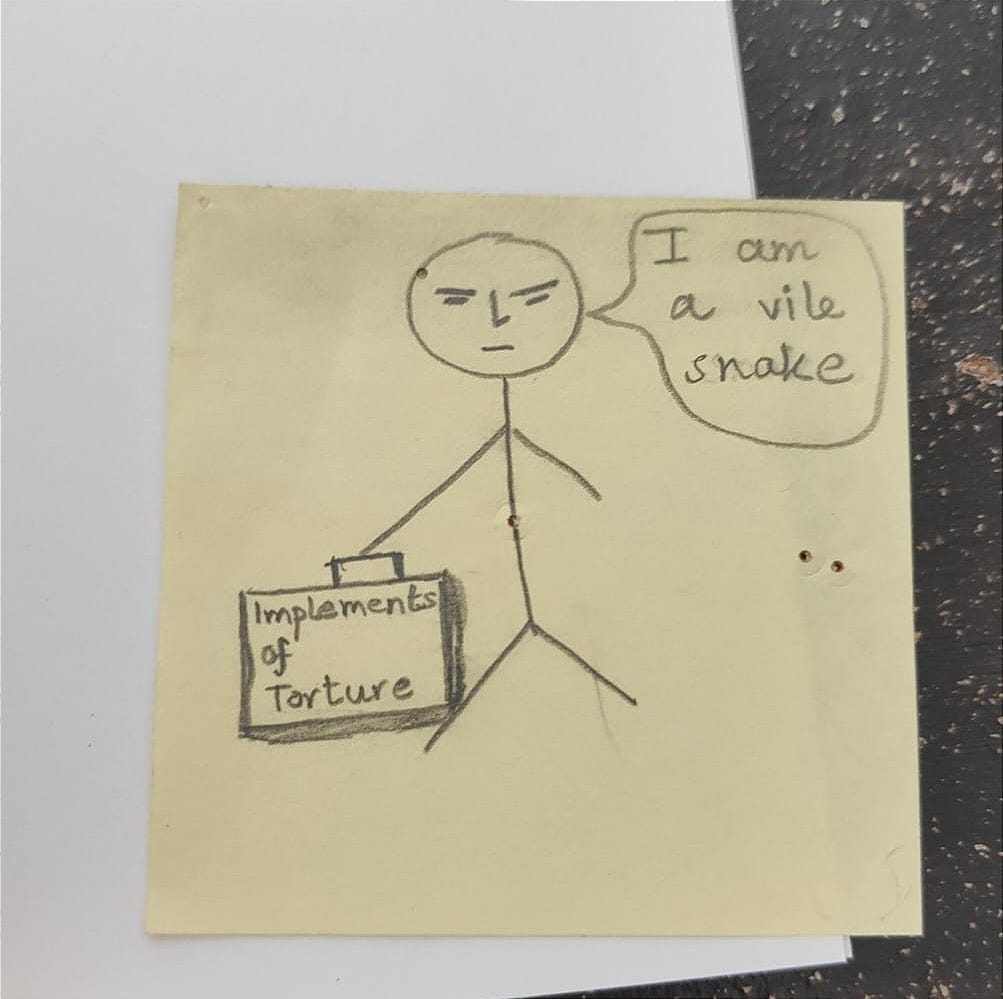‘You said you’re meeting Picole1 for dinner? Have fun! You guys have been friends since nursery, right?’
‘No. We became friends near the end of our time in school. In Class 8, I think.’
‘Ah, that’s much later than your other school-era friendships.’
‘Correct. Because I used to avoid Picole before that.’
‘Why?’
‘Because she punched me.’
‘What?!’
‘She punched me. In the chest. When we were in senior KG.’
Simran rubbed the top of her sternum, as if she could still feel the blow. Her brow was furrowed and there was a grim set to her jaw. Three decades had scarcely served to diminish her indignation.
Since I started this newsletter, I have developed a selfish interest in stories of this sort. I am not proud of admitting it, but my husbandly duty to commiserate with her for this past crime was swept aside by my desire to mine material for a new issue. I scanned the room for my notebook and instituted enquiries.
‘Why did she punch you?’
‘She missed the school bus one day. She arrived at the pick-up spot a little late and signalled at the bus, but nobody noticed and she was left behind. The next day, she claimed I’d seen her but not asked the driver to stop. She said I’d done it on purpose. Then, she punched me.’
‘Well, did you?’
‘Did I what?’
‘Did you see her waving at the bus and not say anything to the driver?’
‘I was five! I had no idea what was going on. It all happened so fast.’
‘Hmm, not a very bright five-year-old.’
I had mumbled the last bit under my breath but Simran has preternatural hearing. Sensing that some punches may be thrown in my own direction, I changed my line of questioning.
‘Did she apologise to you later?’
‘No. Because I did not speak to her for the next eight years.’
‘Maybe she was remorseful about the incident. Maybe she carried the guilt for a long time but could not say sorry because you kept your distance.’
‘I cannot believe you’re taking her side on this. I was the victim!’
I had to spend the next few minutes placating Simran, but after she’d left to meet her one-time assaulter friend, I realised there was some truth in her statement. I did align myself with the perpetrator and was empathetic towards Picole, for I too have been in the unfortunate position of punching someone when I was in kindergarten.

The dispute, if memory serves, involved a bar of Cadbury 5 Star. My companion and I were being ferried to school on a cycle rickshaw. He wanted to dig into the chocolate while I wished to save it till lunchtime — which, I still maintain, was the more judicious approach. At some point, he lost interest in the debate and grabbed the bar out of my hand. My body reacted with an instinctive decisiveness it has never since exhibited in any of my athletic endeavours. In a swift, fluid motion my fist rose from my side, cut through the air and landed on the 5 Star-lover’s nose. The physics of kinetic energy would have been gibberish to our ears but the blood that streamed down his face was all too real. He whimpered; I wailed. I do not wish to undermine his pain but I out-cried him by a mile. His feeble sobs were no match for my blood-curdling howls.
The weight of my regret and the sight of his scarlet-speckled shirt stayed with me long after the tears stopped. I was horrified that my hands could wreak such havoc. And so, I have never punched anybody in anger since that day — but then again, a violent streak can manifest in many ways.
I like to think of myself as an easygoing guy, and this self-assessment holds true until I start driving. There are days when I am a Zen master, whistling in the face of vehicular chaos. I smile at people swerving into my lane and wave at jaywalkers leaping infront of my car — nothing can faze me. On other days, the dam of my forbearance cracks and truant drivers become the subjects of my homicidal fantasies. I have never participated in an actual dust-up on the road — I don’t live in Gurgaon, after all — but I did once give chase to a mini truck.
I was in the final year of law school when it happened. As a newly-minted driver, I was as zealous about following traffic protocol as the Israeli government is to committing genocide. On this particular occasion, I flicked on the indicators, slowed to a crawl, and turned a corner when our car was hit by a mini truck. It was a gentle bump, yielding nothing more serious than a broken headlamp and dented bumper. I stepped out to remonstrate but the truck driver was blasé. He backed up and was driving away when I decided to pursue him on foot. It seemed like a good idea at the time.
Nothing would please me more than to tell you it was all part of a grand scheme. That my dynamism and bravado was meant to shock the driver into saying sorry. That once apprehended, I envisaged the truck crew hanging their heads in shame, perhaps even marvelling at my speed and prowess. After apologizing, they would offer recompense for the damage they’d caused — which I would graciously refuse. It’s not about the money, I would tell them, it’s about principles, about ethics. You must own up to your mistakes. They would clasp my hand, their eyes brimming. Thank you, they would chorus as I walked away, my cloak catching the wind and billowing out behind me. Thank you for showing us the error of our ways.
I would love to tell you this scene was playing in my head when I scampered after them, but in this newsletter I tell no lies. The truth of it is that the red mist was upon me and rationality lay hidden out of sight.
As it happens, I never reached the truck. I sprinted after it for a hundred or so metres, before my fury ran out of fuel. If you ever have the urge to run after a vehicle that has wronged you, I would advise you to desist. Unless you are Eliud Kipchoge or an ichhadhari naag2, you are unlikely to nab your quarry — and being honked at by irate motorists when you’re doubled over and wheezing in the middle of the road can be quite humiliating.

When I started working, a few months later, I knew I would need to keep these rare bouts of rage in check. In that, I was succesful — for the most part. But it wasn’t always easy.
The first thing we do, let’s kill all the lawyers.
— Dick the Butcher (Henry VI, Part II, William Shakespeare)
As much as Dick despised us members of the legal profession, my years as a corporate lawyer convinced me that our clients despised us even more. They would never tire of finding ways to make our lives miserable. Send them a cost estimate and they would haggle over the fees. Send them a ‘Can’t talk now, will speak later’ message and they would call thirty-seven times in five minutes. Send them a brief at midnight and they would reply the next morning, pointing out a single typo. Send them the invoice and they would disappear.
We were taught to grin and bear it. Keep calm and carry on, as it were.

This strategy was well-suited to email conversations. You could type out your vitriol, and then delete the draft. On phone calls, though, you were on stickier wicket.
I was fielding asinine queries from a client once, drawing from my reserves of patience to keep the conversation civil. Eventually, one of his comments breached my defences. Weeks of bitterness and frustration gave an edge to my voice as I told him: ‘Anyone with half a brain would realise what you’re proposing to do is not possible.’
I remember some chap saying something about words and arrows and how they tend to be irreversible. Never have I experienced the import of that adage more keenly than I did then. For many long seconds, a silence stretched between us. I was waiting for the guillotine to fall when he mumbled a response and asked me something else. Perhaps he had not heard me, or perhaps he let it go. In any event, I was lucky. Things would have turned out quite differently if it were an investment banker on the other end of the line.

A commercial lawyer’s Moby Dick (no pun intended) is an investment banker. Look, it’s nothing personal. I don’t think they are born evil — I suspect the villainy is instilled in them as part of their MBA curriculum. Courses on corporate finance and financial accounting are accompanied by modules on skulduggery, egotism, and obnoxiousness. Rigorous training is imparted to make them forget basic human decency. By the time they graduate, their souls drip tar.
I’ve had many interactions with their lot in my life, and I would not care to relive any of them. But no matter how trenchant their remarks, I made sure to keep my emotions in check. Tart replies were never an option — it isn’t wise to bait sharks. Instead, I turned my anger into art. Every time a banker-client got under my skin, I would rip out a post-it and let resentment guide my hand as I sketched a caricature.
Over the years, my cubicle became a gallery of post-its. When I received an infuriating email, or ended an exhausting call, I’d look at them and a warm joy would suffuse my body. These portraits were my prized possessions. I did not name them and they carried no identifiable markers — but I never forgot who they were meant to represent.
In recent years, I’ve grown quite mellow. Freed from the all-consuming stress of legal practice, I have not picked a fight with anyone in a while. Except the pharmacy chain, Noble Plus.
Longtime readers may remember the story and I don’t wish to bore them by repeating it. In brief, it is the age-old tale of a relationship gone sour. I used to visit Noble Plus every day, showering them with my custom — until a fateful morning when they revealed their ignoble nature and betrayed my trust. Where I offered them nothing but love and loyalty, they repaid me with only treachery. Details of the cruel episode are available below:
As I’ve gotten older, I have tried to embrace the teachings of Mahatma Gandhi. My beef with Noble Plus typifies this evolution. I did not respond to their faithlessness with violence. I rose above their perfidy and chose the path of satyagraha, of ahimsa and boycott.
Three years have passed since my vow of renunciation. Other than once occasion — when I visited a different branch — I have steered clear of Noble Plus outlets. I have enjoyed this experiment in non-violence. It offers vindication, without spiking your blood pressure. It also smoothens out the vengeful and jagged contours of your grudges. I have no desire, for instance, to punch Noble Plus.
But if, say, we were lost in a desert and I had a canteen full of water while their stock had run dry and, when we spotted an oasis glimmering in the distance atleast a day’s march away, they asked me for a sip, pleading that they would never make it on their own — I would not offer them a single drop. I think Gandhiji would understand.
Name altered to protect identity. (You’d never guess her real name.)
If you have not watched Jaani Dushman: Ek Anokhi Kahani, please watch it right after you finish reading this. Set aside an entire day — you’ll need three hours for the movie and the rest of the time to recover.







Love you caricature. But love your comment about the Israeli government even more.
I felt seen and heard, when I read that paragraph on investment bankers. 🙏🏽